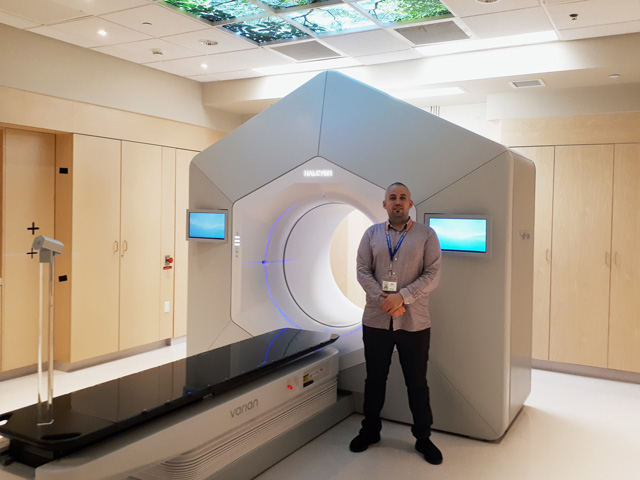Physics Graduate Alumni Success: Kurt Van Delinder, PhD (Biomedical Physics ’20)

Kurt Van Delinder, Biomedical Physics '16
If 2020 was a big year for Kurt Van Delinder, 2021 is turning out to exceed all expectations. After graduating with his PhD in biomedical physics, publishing four articles in high-impact journals as the lead author, and securing a residency at the Juravinski Cancer Centre in the Hamilton Health Sciences system, Van Delinder is now working with what he calls “the coolest technology.”
He is referring to the Halcyon, a new device for cancer treatment which he also helped commission as a member of the Juravinski health team. The first and only of it’s kind in Canada, the Halcyon is the latest technology for delivering fast, high-quality radiation treatments, and Van Delinder is currently working on correlating its detector so it can be used to verify the patient treatment dose in real time.
While most of his time is spent overseeing the technical aspects of radiation oncology treatments delivered by the more standard medical linear accelerator (LINAC), what little is left of Van Delinder’s days—and nights—is spent testing and exploring the incredible potential of the Halcyon.
Why is your work on the Halcyon so important—and so engrossing?
First, I love learning about new technology. I know a lot of students studying medical physics and alumni working in the field are fascinated by the ongoing technical advancements in the treatment of cancer. This device has the potential to move us forward by measuring fast radiation treatments while they happen and open the possibility to make clinical decisions on a fraction-by-fraction basis. That adaptability is a gamechanger. I’m working on helping us get there.
You landed a residency just after graduation. Why do you think that was?
I can’t say enough about how important it is that Ryerson offers a CAMPEP accredited graduate program in medical physics. It’s the only university in Toronto that does. That means that Ryerson grads have a recognized standard in training provided by an independent organization. In my view, the combination of a PhD plus CAMPEP accreditation sets Ryerson grads apart from their peers. We have an incredibly high placement in medical physics compared to other universities. The supervision and support throughout the whole program is also exceptional in preparing grads for a residency.
What’s a residency like in medical physics?
A lot of work! My current focus is on quality assurance, so I spend a lot of time ensuring that the complex treatments determined by oncologists are delivered exactly as planned. That means running hundreds of hours of tests on our LINACs. But like all residencies, I will move around into different areas until I am a well-rounded physicist. Altogether, it’s a two-year program. Afterward, I’ll look for a permanent position in the GTA, which I am confident I will gain. I’ll also pursue an academic posting, which my degree and residency experience will set me up for.
You’ve published an impressive amount for someone so early in your career. Are you working on another paper?
Indirectly, yes. The current work I am doing with the Halcyon is of great interest to the medical community. The amount of tests and simulations required to create a new protocol for real-time treatment verification is monumental. And it’s so new that the information is just not out there. The data does not exist. I’m generating that data now, which will hopefully be used to direct future treatment plans. What excites me the most is helping people to beat cancer and live the lives they deserve.
What would you say to younger students considering Ryerson’s graduate program in medical physics?
I would say, seriously look at it. The future in this field is very bright. There are going to be a lot of jobs, especially for those holding a PhD degree with a CAMPEP accreditation. In fact, with so many positions available, I think the GTA is the best place in North America for residencies in medical physics. Plus, advances in technology in radiation oncology are going to keep this field expanding. There is constant innovation. Anyone who loves science, helping people and working with advanced cool technology will find this career rewarding.